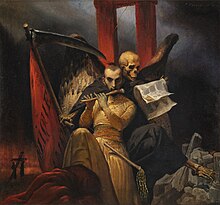
| Part of a series on |
| Socialism |
|---|
 |
Criticism of socialism is any critique of socialist economics and socialist models of organization and their feasibility, as well as the political and social implications of adopting such a system. Some critiques are not necessarily directed toward socialism as a system but rather toward the socialist movement, parties, or existing states. Some critics consider socialism to be a purely theoretical concept that should be criticized on theoretical grounds, such as in the economic calculation problem and the socialist calculation debate, while others hold that certain historical examples exist and that they can be criticized on practical grounds. Because there are many types of socialism, most critiques are focused on a specific type of socialism, that of the command economy and the experience of Soviet-type economies that may not apply to all forms of socialism as different models of socialism conflict with each other over questions of property ownership, economic coordination and how socialism is to be achieved. Critics of specific models of socialism might be advocates of a different type of socialism.
According to the Austrian School economist Ludwig von Mises, an economic system (specifically centralized economic planning) that does not use money, financial calculation, and market pricing would be unable to effectively value capital goods and coordinate production, and therefore in his view socialism is impossible because it lacks the necessary information to perform economic calculation in the first place.[1][2] Another central argument leveled against socialist systems based on economic planning is based on the use of dispersed knowledge. Socialism is unfeasible in this view because information cannot be aggregated by a central body and effectively used to formulate a plan for an entire economy, because doing so would result in distorted or absent price signals; this is known as the economic calculation problem.[3] Other economists criticize models of socialism based on neoclassical economics for their reliance on the faulty and unrealistic assumptions of economic equilibrium and Pareto efficiency.[4]
Some philosophers have criticized the aims of socialism, arguing that equality erodes away at individual diversities and that the establishment of an equal society would have to entail strong coercion.[5] Many critics point to the mass killings under communist regimes as an indictment of socialism; some socialists respond that they were aberrations, point to mass deaths they argued were caused by capitalism and imperialism, and some say that they are not the socialist model they support. Economic liberals and right-libertarians view private ownership of the means of production and the market exchange as natural entities or moral rights which are central to their conceptions of freedom and liberty and view the economic dynamics of capitalism as immutable and absolute. As a result, they perceive public ownership of the means of production and economic planning as infringements upon liberty.[6][7]
- ^ Von Mises, Ludwig (1936) [1922]. Socialism: An Economic and Sociological Analysis (English ed.). p. 119.
- ^ Von Mises, Ludwig (1990). Economic Calculation in the Socialist Commonwealth (PDF). Mises Institute. Retrieved 8 September 2008.
- ^ F. A. Hayek, (1935), "The Nature and History of the Problem" and "The Present State of the Debate," in F.A. Hayek, ed. Collectivist Economic Planning, pp. 1–40, 201–243.
- ^ Stiglitz, Joseph (1996). Whither Socialism. MIT Press. ISBN 978-0262691826.
- ^ Self, Peter. Socialism. A Companion to Contemporary Political Philosophy, editors Goodin, Robert E. and Pettit, Philip. Blackwell Publishing, 1995, p. 339 "Extreme equality overlooks the diversity of individual talents, tastes and needs, and save in a utopian society of unselfish individuals would entail strong coercion; but even short of this goal, there is the problem of giving reasonable recognition to different individual needs, tastes (for work or leisure) and talents. It is true therefore that beyond some point the pursuit of equality runs into controversial or contradictory criteria of need or merit".
- ^ "On Milton Friedman, MGR & Annaism". Sangam.org. Retrieved 30 October 2011.
- ^ Bellamy, Richard (2003). The Cambridge History of Twentieth-Century Political Thought. Cambridge University Press. p. 60. ISBN 978-0521563543.